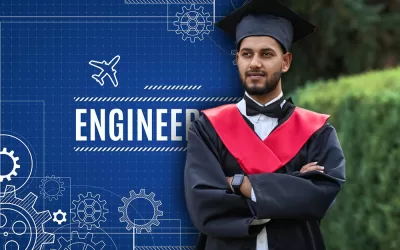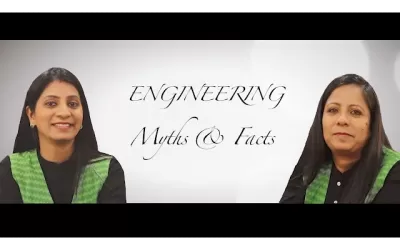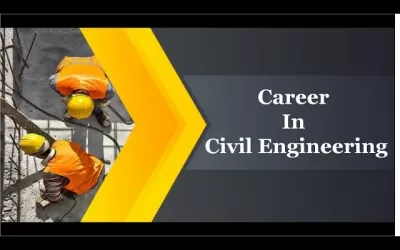 Branching Out: Exploring Different Routes of Engineering
Branching Out: Exploring Different Routes of Engineering
Ms.Mugdha Shetye talks about the different routes to enter the field of engineering. There are two common routes to enter the field of engineering which is Diploma and Degree. After 10th one can do Diploma. The entry is on the basis of merit. First is common for all the specialization. Duration for diploma course is 3 years. One can get lateral entry in 2nd year of diploma if one can cleared ITI engineering 2 years trade.
But it is important that one ensure good marks in the academics to get admission. If one has done diploma and had good academic record throughout three years then one may take lateral entry in 2nd year of Bachelors program depending on the availability of the seats. The other route can be continuing class 11th and 12th in Science stream with Physics, chemistry and Mathematics to be compulsory subjects.
One needs to clear relevant entrance exam to seek admission. One needs to have good academic performance and entrance exam score to get the desired specialization. The first year is common for all specialization. One studies the subjects of specialization from 2nd year till the final year. Duration for the degree course is 4 years without any failure and 3 years if the course is done through lateral entry after Diploma.
There are 50 plus specialization in Engineering. Apart from the diploma and degree there are other routes known as external routes. External routes options are available for students who could not complete their engineering due to some reasons. With this route one can complete their education even if there is a gap after class 12th. Different external routes could be AMIE, AMICHE, IIIE and so on.
But one needs to ensure that one had practical experience and good academic record to get the desired specialization. Every area of engineering has scope. However, it is important that one understands the basic concepts and enhances one’s skills as per the demands of the field. Equip yourself in the right manner and the scope gets created.
Frquently Asked Question For Different Routes of Engineering
1. What are the different routes of engineering?
Engineering offers various specialized fields such as mechanical, electrical, civil, chemical, computer, biomedical, and aerospace engineering, each focusing on unique aspects of technology and innovation.
2. How do I choose the right engineering route for me?
Consider your interests, strengths, career goals, and the industries that resonate with you. Research each field’s responsibilities and opportunities to make an informed decision.
3. What is mechanical engineering and its applications?
Mechanical engineering involves designing, analyzing, and manufacturing mechanical systems and devices, including machines, engines, and industrial equipment.
4. What does electrical engineering encompass?
Electrical engineering involves working with electrical systems, electronics, and technology, including areas like power generation, telecommunications, and control systems.
5. What is civil engineering and its significance?
Civil engineering focuses on designing and constructing infrastructure projects such as buildings, bridges, roads, and dams, contributing to urban development and public safety.
6. How does chemical engineering contribute to industries?
Chemical engineering involves processes related to chemicals, materials, and manufacturing. It’s vital in sectors like pharmaceuticals, energy, and environmental management.
7. What is computer engineering and its role in technology?
Computer engineering combines electrical engineering and computer science to design and develop computer systems, software, and hardware components.
8. What is biomedical engineering and its impact on healthcare?
Biomedical engineering applies engineering principles to healthcare, designing medical equipment, prosthetics, and technologies for diagnosing and treating diseases.
9. Can I switch between different engineering routes during my education or career?
Depending on the similarities between fields, you might have opportunities to switch or bridge between routes with additional education or training.
10. How do these engineering routes impact society and innovation?
Each engineering field contributes to technological advancements that improve daily life, promote sustainability, and address global challenges.
11. What are some emerging fields in engineering?
Emerging fields include environmental engineering, renewable energy engineering, data science engineering, and nanotechnology, among others.
12. Can I combine engineering routes in my career?
Yes, interdisciplinary careers are possible. Engineers often collaborate across fields to tackle complex projects and address multidisciplinary challenges.
13. How do I stay updated with advancements in my chosen engineering route?
Engage in continuous learning, attend industry conferences, join professional organizations, and follow research publications and technological trends.
14. What are the prospects for engineering graduates?
Engineering professionals are in demand across various industries, from technology to healthcare, and can expect continued opportunities for growth and innovation.
15. How do different engineering routes contribute to sustainable development?
Engineers play a vital role in creating sustainable solutions, such as green energy technologies, eco-friendly materials, and efficient urban planning.
Choosing an engineering route is a significant decision that can shape your career and impact the world around you. Whether you’re drawn to designing structures, creating innovative technologies, or advancing healthcare, the diverse routes of engineering offer a range of exciting opportunities for you to explore and contribute to global progress.

 Branching Out: Exploring Different Routes of Engineering
Branching Out: Exploring Different Routes of Engineering




